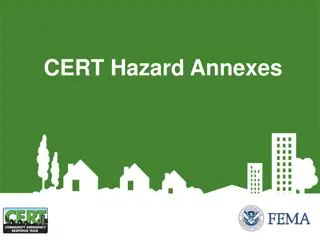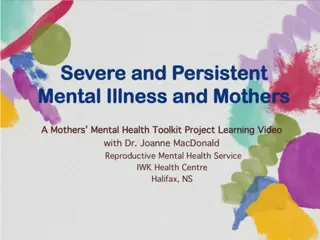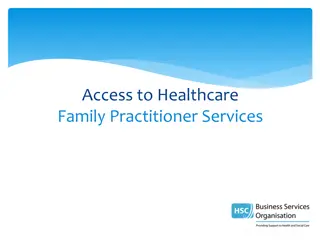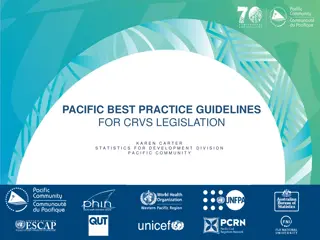Evolution of Access to Healthcare Legislation for Critical Illnesses
Legislation has evolved over the years to improve access to healthcare for individuals with critical illnesses like ALS and metastatic breast cancer. Waiting periods were eliminated to ensure timely coverage, with strategic decisions made to involve key stakeholders in the process, ultimately leading to the passage of crucial acts like the ALS Disability Insurance Act and the Lymphedema Treatment Act in recent Congresses.
Download Presentation

Please find below an Image/Link to download the presentation.
The content on the website is provided AS IS for your information and personal use only. It may not be sold, licensed, or shared on other websites without obtaining consent from the author.If you encounter any issues during the download, it is possible that the publisher has removed the file from their server.
You are allowed to download the files provided on this website for personal or commercial use, subject to the condition that they are used lawfully. All files are the property of their respective owners.
The content on the website is provided AS IS for your information and personal use only. It may not be sold, licensed, or shared on other websites without obtaining consent from the author.
E N D
Presentation Transcript
Metastatic Breast Cancer Access to Care Act Team Leader Deep Dive
History of Waiting Periods When it was instituted in 1972, the waiting period for SSDI beneficiaries was intended to limit Medicare costs, avoid displacing private coverage, and ensure that Medicare coverage was extended only to people whose disabilities were severe and long-lasting. CommonWealth Fund Issue Brief, July 20003 Elimination of Medicare s Waiting Period for Seriously Disabled Adults: Impact on Coverage and Costs
History of MBCACA MBCACA was modeled on similar legislation for individuals with ALS ALS waiting periods were eliminated via two bills In 2000, the 24-month waiting period for Medicare was eliminated through legislation and In 2020 the 5-month waiting period was eliminated
ALS Disability Insurance Act of 2019 HR 1407 Moulton/Lee had 305 cosponsors S.578 Whitehouse/Cotton had 67 cosponsors Did not move through regular order (didn t go through committee) Passed in 2020 (116thCongress)
Lymphadema Treatment Act Passed in 117thCongress. No CBO score House: H.R. 3630 Schakowsky/Carter Rep. Schakowsky on Committee of Jurisdiction (Energy & Commerce) Proceeded through regular order voted out of Energy & Commerce Committee 356 cosponsors Passed on House floor Senate: S. 1315 Cantwell/Grassley Both leads on committee of jurisdiction 74 Cosponsors Passed via Omnibus spending bill
Regular Order Introduction Collect cosponsors Committee: hearing/markup/vote Floor vote
History Introduced in the House Only 115th Congress King/Castor 96 House cosponsors House: King/Castor 180 cosponsors 116th Congress Senate: McSally/Murphy 24 cosponsors House: Castor/Katko 240 cosponsors 117th Congress Senate: Murphy/Ernst 29 cosponsors
Strategic Decisions Introduction: How we chose House and Senate Leads Committee consideration: Committee staff input CBO Score: Committee requests and is responsible for securing CBO score. SSA/ Medicare Actuaries analysis Leadership outreach: Bringing bill to floor significant outreach/conversations with leadership to bring bill to floor in 117th Congress House v. Senate: Momentum in House last Congress, Senate was prepared to act if House passed the bill.
Jurisdiction 118thCongress House Ways & Means Committee Chair: Jason Smith (R-MO) Ranking Member: Richard Neal (D-MA) Subcommittee on Social Security Chair: Drew Ferguson (R-GA) Ranking Member: John Larson (D-CT) Senate Finance Committee Chair: Ron Wyden (D-OR) Ranking Member: Mike Crapo (R-ID) Subcommittee on Social Security, Pensions & Family Policy Chair: Sherrod Brown (D-OH) Ranking Member: Thom Thillis (R-NC)
House Ways & Means House Ways & Means Committee Chair: Jason Smith (R-MO) Ranking Member: Richard Neal (D-MA) Jason Vern Adrian M. Mike David Darin Brad R. Jodey A. Drew Ron Lloyd K. Kevin Carol D. Gregory David Brian K. W. Gregory Claudia Michelle Blake Michelle Beth Smith Buchanan Smith Kelly Schweikert LaHood Wenstrup Arrington Ferguson IV Estes Smucker Hern Miller Murphy Kustoff Fitzpatrick Steube Tenney Fischbach Moore Steel Van Duyne R H MO R H FL R H NE R H PA R H AZ R H IL R H OH R H TX R H GA R H KS R H PA R H OK R H WV R H NC R H TN R H PA R H FL R H NY R H MN R H UT R H CA R H TX Randy Nicole Mike Richard E. Lloyd Mike John B. Earl Bill Danny K. Linda T. Brian Terri Suzan K. Judy Gwen Daniel T. Donald Dwight Bradley Scott Schneider Jimmy Feenstra Malliotakis Carey Neal Doggett Thompson Larson Blumenauer Pascrell, Jr. Davis S nchez Higgins Sewell DelBene Chu Moore Kildee Beyer, Jr. Evans R H IA R H NY R H OH D H MA D H TX D H CA D H CT D H OR D H NJ D H IL D H CA D H NY D H AL D H WA D H CA D H WI D H MI D H VA D H PA D H IL D H CA Panetta
Senate Finance Committee Senate Finance Committee Chair: Ron Wyden (D-OR) Ranking Member: Mike Crapo (R-ID) Debbie Stabenow D S MI Michael D. Crapo R S ID Maria Cantwell D S WA Charles E. Grassley R S IA Robert Menendez D S NJ John Cornyn R S TX Thomas R. Carper D S DE John Thune R S SD Benjamin Cardin D S MD Tim Scott R S SC Sherrod Brown D S OH Bill Cassidy R S LA Michael Bennet D S CO James Lankford R S OK Robert P. Casey Jr. D S PA Steve Daines R S MT Mark Warner D S VA Todd Young R S IN Sheldon Whitehouse D S RI John A. Barrasso MD R S WY Margaret Hassan D S NH Thom Tillis R S NC Catherine Cortez Masto D S NV Ron Johnson R S WI Elizabeth Warren D S MA Marsha W. Blackburn R S TN
Other Waiting Period Bills Stop the Wait Act (S.320/H.R. 883) Sen. Casey/Rep. Doggett Phases out the waiting period for SSDI. It eliminates the waiting period for Medicare only for individuals who are uninsured or unable to afford health insurance (applies only to people in states that have not expanded Medicaid). Senate bill has 11 cosponsors all Democrats House bill has 94 cosponsors 3 Republicans Not yet Introduced this Congress: Immediate Access for Terminally Ill Act (Sen. Lee), Social Security 2100 Act (Rep. Larsen)
Tough Questions Why should we create an exception (waiver of 24 month waiting period for Medicare and 5 month waiting period for SSDI) only to people diagnosed with metastatic breast cancer? Would this proposal increase the number of individuals who are eligible for Medicare/Social Security Disability? Weren t these waiting periods put into place for a reason? Shouldn t we reform Medicare generally instead of fixing things by a piecemeal approach? Why should we single out metastatic breast cancer for a waiting period waiver when there are other serious illnesses for which there is no similar exception? How much is this going to cost?/Is there a CBO score? Can t the individuals who have metastatic breast cancer find other means of coverage while they wait for their SSDI and Medicare benefits to become available?
Tough Questions Why should we create an exception (waiver of 24 month waiting period for Medicare and 5 month waiting period for SSDI) only to people diagnosed with metastatic breast cancer? Individuals who qualify are under 65 and diagnosed with metastatic breast cancer already qualify for SSDI and Medicare. However, based on the limited life expectancy of individuals with metastatic disease, an average of 3 years, the waiting periods for receiving these benefits should be waived.
Tough Questions Would this proposal increase the number of individuals who are eligible for Medicare/Social Security Disability? No. It does not at all affect the eligibility criteria for disability under SSDI that confer Medicare eligibility. Those criteria would not change. The bill would only waive the 24 month/5 month waiting periods for individuals already deemed eligible.
Tough Questions Weren t these waiting periods put into place for a reason? Initially, these waiting periods were put into place to address conditions that could reverse or improve, resulting in the individual no longer deemed to have a disability. In the case of metastatic breast cancer, there is no reversal and no cure.
Tough Questions Shouldn t we reform Medicare generally instead of fixing things by a piecemeal approach? This bill would not affect Medicare; it addresses waiting periods in the Social Security Act.
Tough Questions Why should we single out metastatic breast cancer for a waiting period waiver when there are other serious illnesses for which there is no similar exception? The notion that we can t help anyone until we help everyone is not an effective, timely or compassionate approach. For individuals with metastatic breast cancer, time is of the essence. They simply do not have time to wait for benefits that they already qualify for, and that they so desperately need.
Tough Questions How much is this going to cost?/Is there a CBO score? The Metastatic Breast Cancer Access to Care Act does not yet have CBO score. As advocates, our role is to advocate for the solution. We owe it to the individuals dying of metastatic breast cancer to make sure they can immediately access these healthcare benefits that they have already qualified for, and that they deserve immediately. It is Congress role to obtain a score.
Tough Questions Can t the individuals who have metastatic breast cancer find other means of coverage while they wait for their SSDI and Medicare benefits to become available? A specific carve out was already created for individuals with metastatic breast cancer who lose their job and health insurance to be able to qualify for SSDI and Medicare. Metastatic breast cancer is also a condition included under the Compassionate Allowance program expediting approval for SSDI, specifically because of the progressive and fatal nature of the disease. Even with expedited approval, individuals who qualify still have to wait to receive their benefits. There are limited insurance options for individuals with metastatic breast cancer and even if short term options are available in their state, the premiums are often prohibitive for individuals too sick to work and no longer receiving an income. Many short term insurance plans are wholly inadequate in the face of a serious medical condition. The bottom line is that there is already a program in place for which these individuals qualify; making them wait an arbitrary 5 months and 24 months when many of them will not live to see their benefits is cruel and unnecessary.
Tough Questions What Questions are you Hearing? .























